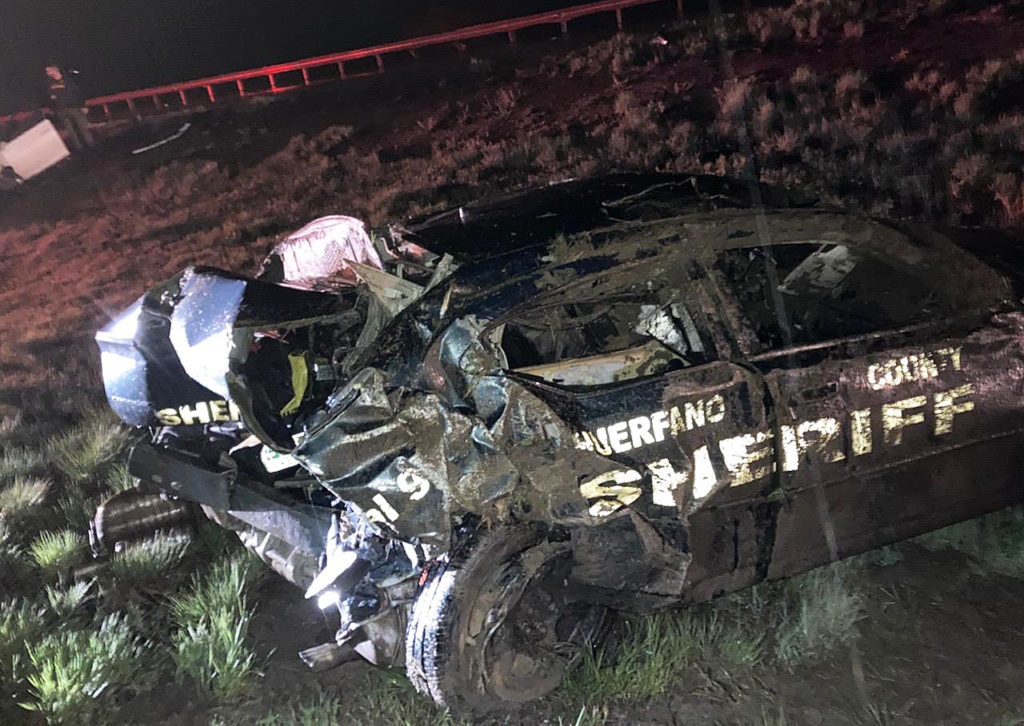
In a rural Colorado county, an injured deputy pleaded for justice after suffering a life-altering crash. Deputy Scott Eckhardt, now disabled and retired, appeared at a sentencing hearing for Travis Fouch. In May of 2021, Fouch led a multi-jurisdictional pursuit along I-25 in southern Colorado and was subsequently charged with 1st Degree Assault, Vehicular Assault, Vehicular Eluding, Operating an Uninsured Motor Vehicle, Reckless Driving, Failing to Drive in Designated Lane, and Possessed an Open Alcoholic Beverage in a vehicle after striking Deputy Scott Eckhardt’s patrol car with his vehicle.
The Huerfano County District Attorney had agreed to a plea that would have resulted in a deferred sentence and probation. Fouch would have walked away with a minimal penalty, but then Eckhardt spoke. “I appreciate that the court has agreed to let me read from this statement as I struggle with my short-term memory because of injuries received to my brain and cognitive function because of the rollover crash.
I was a Deputy Sheriff with the Huerfano County Sheriff’s office until the accident and on leave because of my injuries, in January of this year, I was medically retired. I say WAS because as of January, I am no longer able to fulfill my duties as a deputy with the department and have since been medically released from duty due to the injuries I sustained that night.”
The deputy then cited the multiple injuries: traumatic brain injury, loss of clear speech, vision impairment, hearing loss, loss of smell and taste, loss of cognitive function and short-term memory along with multiple facial surgeries still in treatment. The deputy suffered lacerations, broken ribs, and PTSD. And the loss of his career and financial hardship. “At the end, he will have a clean record like it never happened.” He asked the court “Where is my deferred sentence for the damage he criminally caused, when do I get to walk away from this like nothing ever happened? The only answer is that I will not” stating that his injuries are a life sentence.
In Colorado, as in most other states, the law imposes obligations on law enforcement and prosecutors to afford victims certain rights. These include being appraised of the status of the case. Eckhardt told the court that it was explained to him that other cases had priority and the DA’s office needed to “clear their desks of some cases including this one because there were so many”, and that he was not notified of the plea agreement as required by the Victim Rights Amendment in the Colorado Constitution.
“That there are no real consequences to face even if you tried to kill an officer. Who will protect those who protect if not the DA and this court? If there is no one to protect us and have our backs when we need it how long do you think those who protect the citizens will stay around? Especially if the criminal element in the community finds out there is no punishment for hurting one of us” Eckhardt asked.
It is a good question. This writer’s survey of law enforcement officers revealed the national shame of failing to serve crime victims who happen to be police officers in the line of duty. Nearly 40% of officers responding to the survey said that their prosecutor considers being assaulted as part of the officer’s job. Only 41% said that their prosecutor takes the offense of assaulting an officer seriously. Charges of assault on an officer are among the first to be dropped when an offender faces multiple charges according to 61% of officers. In 45% of cases, dispositions were made without the officers’ knowledge or input, for only 31% were officers consulted on charges or sentencing for assault or resisting charges or allowed to make a victim statement. Only 11% report being offered victim assistance, counseling, or compensation after an assault.
The survey also found that a significant percentage of officers have not sought medical treatment for injuries on the job, or pursued criminal charges, believing that the cases would never be pursued by prosecutors. Over 10% have given thought to abandoning their law enforcement career as a result.
In Eckhardt’s case, his moving statement resulted in the court’s rejection of the plea. The final outcome is yet to be decided, but the deputy’s statement rings true all too often across the nation. If the justice system for which law enforcement officers are willing to give their lives abandons them, who will protect our protectors?